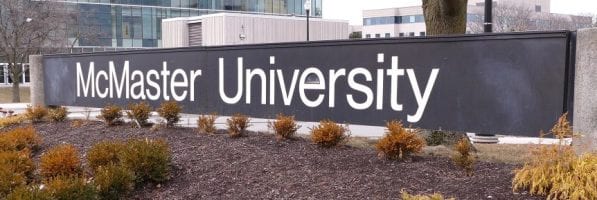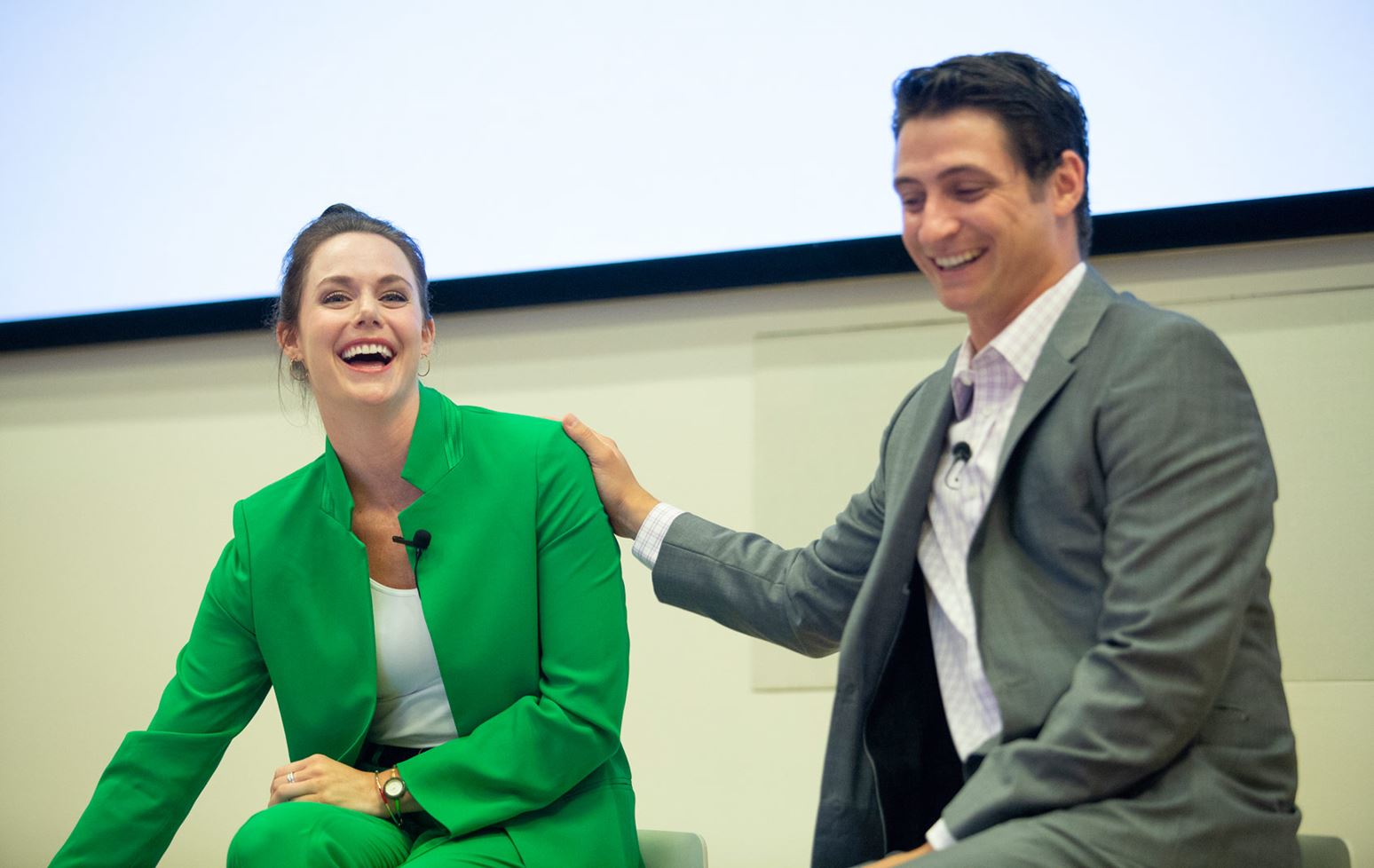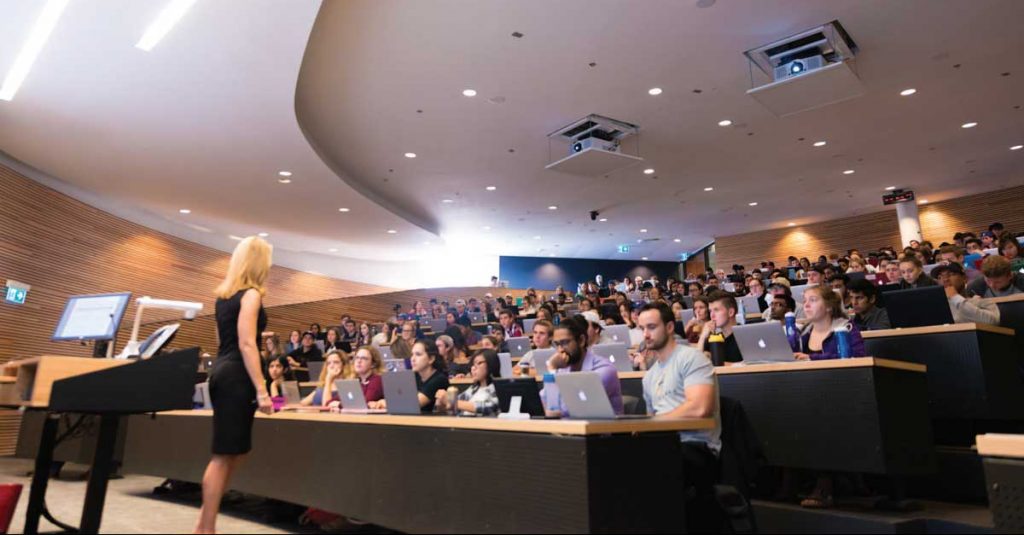McMaster University Receives $15 Mil. Donation, and More – Toronto News

Toronto’s business schools have had an active week, filled with exciting new developments. Below, we’ve laid out some of the highlights.
McMcaster University Receives $15 Million Donation For Its Commerce Program – The Globe and Mail
Paul McLean and his family have contributed $15 million CAD to McMaster University’s DeGroote School of Business. Private donations will go toward revamping the school’s undergraduate commerce program. McLean’s gift will be added to the $50 million undergraduate business education building—scheduled to open in 2022.
McLean, who earned his undergraduate degree and MBA at McMaster, is the Chief Executive Officer of CWB Maxium Financial. He feels passionate that this donation will lead to a valuable and “potentially revolutionary” learning experience for those involved.
Len Waverman, Dean of the DeGroote School of Business, says:
“When you think about the way the world is changing, it is beyond hype; and with artificial intelligence, it does change the nature of work and the nature of the occupations students go into…everyone has similar ideas that our students have got to be creative, think outside of the box and be able to transform themselves.”
You can learn more about the donation here.
Doug Ford’s Fix for Toronto’s Housing Crisis is Easy: Just Build More Homes – Financial Post
The Financial Post recently highlighted the push from Doug Ford, the Ontario Premier, to build more homes in Toronto as a solution to housing shortages.
Toronto’s housing prices have doubled in the past decade, and experts are debating the best solution to re-mediate. Demand measures are controversial, as they disproportionately affect younger buyers and buyers in lower socioeconomic brackets. Ford argues that supply measures would grow the markets in a stable and maintainable way.

Just in the past five years, housing costs in Toronto have risen 60 percent, according to The Financial Post.
The Financial Post spoke with Michael Fenn, a visiting fellow at the Lawrence National Centre at Western University Canada’s Ivey Business School, on the rising costs. According to Fenn, “Keeping housing of a variety of types affordable and available is crucial to the economic success of the GTA and the country generally.”
You can read more about the Toronto housing crisis here.
30 Exceptional Educators Recognized As Canada’s Outstanding Principals – The Learning Partnership
Recipients of Canada’s Outstanding Principal Award were recently announced, and will be honored at a ceremony at the University of Toronto’s Rotman School of Management on February 26, 2019.
Additionally, the honorees have the opportunity to attend a leadership training program at Rotman, wherein they will learn about management practices from experts in various fields. This year marks the 15th anniversary of The Learning Partnership’s Outstanding Principal Award.
Debra D. Kerby, President and CEO of The Learning Partnership, says:
“From Rankin Inlet, NU to Vancouver, BC to Richmond PEI, we are honored to recognize principals from coast to coast to coast. Principals are so important to the success of our schools and our students. They ensure our schools are dynamic, engaging places to learn, and that student are inspired every single day. These principals are enabling students to thrive in an increasingly diverse and changing world. These 30 principals are all instrumental in connecting students, educators, families and the community together, and we recognize their indispensable contributions to helping Canada continue as a global leader in education.”
The recipients were nominated by parents, faculty, and members of their community. They will join the National Academy of Canada’s Outstanding Principals, which will afford them, “… networking, mentoring and professional development opportunities to enhance their leadership skills.”
You can learn more about the awards here.
The 5 Highest Paid Toronto Internships for MBAs

Toronto is Canada’s largest city and home to leading companies in both business and finance. There’s a particularly large concentration of banks as well as media companies, publishing firms, telecommunication, IT, and film production companies. There’s a little bit of everything in the city including top MBA programs such as McMaster University’s DeGroote School of Business, Ryerson University’s Ted Rogers School of Management, and York University’s Schulich School of Business.
But where should you look for paid Toronto internships? First, the industry you choose matters. According to the 2018 employment report from the University of Toronto’s Rotman School of Management, you should stick with three industries if you want to earn the most money: law/legal services ($18,000 per month), consulting ($6,332 per month), and financial ($5,623 per month).
Specifically, you might want to check out these five high paying internships in the Toronto metro.
The 5 Highest Paid Toronto Internships for MBAs

Sun Life Financial is a Canadian financial services company headquartered in Toronto. It is as one of the largest life insurance companies in the world, spanning back to 1865. The company pulls in around $28.5 billion in revenue each year, with over 30,000 employees worldwide.
MBA students looking for an MBA internship have multiple options. In particular, there are positions in finance, HR, and real estate. There are also co-op options in the Business Leaders Internship Program. This program gives students ten weeks to work in a number of functional areas to learn where they can be successful.
According to Glassdoor, interns can expect to earn:
- Salary: $3,166 – $4,333 Per Month

Ontario Power Generation, owned by the government of Ontario, is responsible for half of the electricity generation in the Province. The company uses nuclear, hydroelectric, wind, gas, and biomass electricity. The energy diversity helps pull in about $4.73 billion in revenue each year, employing 10,840 people.
For MBA students, the company offers both winter and summer internship opportunities. Interns analyze new business opportunities, pitch marketing, complete customer research, and perform business model development.
Glassdoor reveals that an average intern earns:
- Salary: $4,160 – $5,440 Per Month

BMO Financial Group is a Canadian multinational banking and financial services company. It’s one of the big five banks of Canada and is the fourth-largest by market capitalization and assets. In fact, it’s one of the ten largest banks in all of North America with $21.7 billion in revenue each year and 45,200 employees.
YOU MAY ALSO LIKE: What MBAs Should Know About BMO Financial
An MBA internship at BMO can cover a variety of job functions from financial modeling analyst to program management, investment banking, and capital markets. Through the program, students gain hands-on experience working with a team of seasoned professionals.
According to Glassdoor, an MBA intern can expect to earn:
- Salary: $3,000 – $4,160 Per Month

The Royal Bank of Canada (RBC) is a multinational financial services company and the largest bank in the country by market capitalization. It services over 16 million clients worldwide with personal banking services and products. 2017 estimates were around $40.6 billion in annual revenue with 79,000 employees.
RBC is home to a robust internship program with opportunities to work as a data scientist, business analyst, capital markets advisor, global equities, and more. Each internship program provides MBA students with the chance to work as a strategic advisor across a variety of industries from energy to health care, technology, real estate, media, and more.
As an intern, you can expect to earn a good salary according to Glassdoor:
- Salary: $4,833 – $5,166 Per Month

TD Securities is another Canadian investment bank and financial services company, offering advisory and capital market services. It is particularly known for providing expertise in corporate and investment banking, capital markets, and global transaction services. In 2016, TD Securities earned $3.03 billion in revenue with just 3,800 employees.
As far as internships for MBA students, there are many interesting 10-week options with business tracks in corporate and specialty banking as well as retail and product. These internships provide practical, hands-on experience, and can lead to participation in the 12-month MBA Associate Track Program post-graduation.
Based on intern salaries submitted to Glassdoor, MBA students can expect to earn:
- Salary: $3,250 – $4,166 Per Month
Adam Grant’s Favorite Books, Olympic Winners, and More – Toronto News

Recent weeks have seen exciting developments and events for Toronto metro business schools. We’ve laid out some of the high points below.
17 Business Leadership Books That Have Helped MBA Students Succeed in the Business World – Business Insider
Business Insider contributor Adam Grant, perhaps the most famous business school author in the world today, just released a list of 17 books that he finds beneficial for MBA’s entering the workforce. His list includes “The Hard Thing About Hard Things: Building a Business When There Are No Easy Answers” by Ben Horowitz. Noura Sakkijha, co-founder of Mejuri and graduate of McMaster University’s DeGroote School of Business, was highlighted as someone who found Horowitz’s book particularly beneficial:
“I love learning through successful people’s real-life experiences and this book provides an extremely practical and honest experience about running a company, managing people, and handling tough problems.”
Grant also highlights “Power Up: How Smart Women Win in the New Economy” by entrepreneur Magdalena Yesil, who was one of the primary investors in what would become multi-billion dollar tech powerhouse SalesForce, and “Delivering Happiness: A Path to Profits, Passion, and Purpose” by Tony Hsieh, the CEO of online shoe giant Zappos. Check out the rest of Grant’s 17 favorite books here.
Tessa Virtue and Scott Moir: “The Perfect Partnership” – News@Ivey
Olympic figure skating medalists Tessa Virtue and Scott Moir recently spoke at Western University Canada’s Ivey School of Business, delivering the keynote address for HBA Leadership Day. In addition to providing advice on how to succeed in a competitive sport, the couple offered insight into what has made their relationship work over the past two decades.

Olympic figure skating medalists Tessa Virtue and Scott Moir, the keynote speakers at the Ivey School of Business HBA Leadership Day / Photo via ivey.uwo.ca
“We always skate well when we’re on the same page both on and off the ice,” Moir says. “Having each other’s back was our biggest advantage over our competitors.” Virtue also shared the obstacles that come with being a woman in an athletic field. She indicated that as her success rose, so did the amount of scrutiny, criticism, and vulnerability she experienced.
“Every time you get to the top of a mountain, there’s another summit. You’re at one of the best—if not the best—business schools in Canada. You’ve already accomplished so much. But this is where you take off. This is the beginning of a great journey for you.” – Scott Moir and Tessa Virtue
You can read more about the skating duo and the recent Ivey HBA Leadership Day here.
Ryerson, Maple Leafs Announce New Future of Sport Lab – MetroMBA
The brand new Future of Sport Lab, was announced on Tuesday, Sep. 11, 2018 as a brand new partnership between Maple Leaf Sports and Entertainment, Ltd. (MLSE) and Ryerson University. The school, according to a recent press release, notes, “the objective of the FSL is to be Canada’s leader in sport innovation, creating a sport business ecosystem that will connect Canadian sport properties and industry partners, entrepreneurs, faculty, and students. Together, they will support and foster innovative sport business solutions and technologies along with sport industry research, insights, and education.”
The new program will be directed by Dr. Cheri L. Bradish, the Loretta Rogers Research Chair in Sport Marketing with the Ted Rogers School of Management. In an interview, Bradish says, “Toronto is truly a world-class sport business city. The Future of Sport Lab will bring together the incredible talent that’s already here and give them a chance to collaborate and create solutions with real world impact. This will be the new home of sport innovation in Canada.”

Cheri Bradish, Director of the Future Sport Lab (back, right), with Humza Teherany, Sumit Arora, Teresa Resch, and Jennifer MacInnis / Photo via ryerson.ca
You can learn more about the Future of Sport Lab here.
Rotman Prof Talks Theranos Fraud, and More – Toronto News

People affiliated with Toronto‘s finest business schools have been making the news. Below, we’ve laid out some of this week’s highlights.
How Board Diversity Might Have Prevented the Theranos Fiasco – The Globe & Mail
Andras Tilcsik, Canada Research Chair in strategy, organizations, and society at the University of Toronto’s Rotman School of Management coauthored an opinion piece in The Globe & Mail with Chris Clearfield, Principal at System Logic. The article addressed the fraud charges lodged against Theranos founder Elizabeth Holmes.
Holmes, who was listed as one of Forbes’ “Youngest Self-Made Billionaires” has been charged with “massive” fraud involving upwards of $700 million USD. Holmes has agreed to cede control of her company, which was boating more innovated methods of blood-testing to potential investors.
Tilcsik and Clearfield argue that Holmes’s mistakes might have been prevented had a systemic problem in businesses been addressed at Theranos: board diversity. All but two Theranos board members were white men over 60. According to the article, “… lab experiments show that while homogeneous groups do less well on complex tasks, they report feeling more confident about their decisions.”

Holmes’ equity stake in Theranos, the notorious blood-testing startup she founded, has been reduced to virtually nothing after being charged with large-scale fraud from the SEC.
Learn more about the importance of board diversity here.
YouTube Star Choreographs a Career Blending Bollywood and Business – The Globe & Mail
Shareen Ladha, graduate of York University’s Schulich School of Business, used her MBA to guide her in an unconventional career goal. She wanted to build success producing and dancing in Bollywood-esq videos on YouTube, achieving massive momentum when she did a Bollywood-style remix of Justin Bieber’s “Sorry.” The video quickly went viral, and now Ladha balances making YouTube videos with her career as a senior strategist with McCann.
“Through my MBA, I decided that this was the thing that made me unique and it was proof I could bring a creative aspect to strategy and consulting,” Ladha said in a recent profile with the Globe & Mail.
“It started getting woven into my daily life and daily conversations I would have with people. All my social media accounts were public, so if they ever looked me up or were friends with me, they’d know about it. There was such a positive response.”
You can read more about the YouTube star here.
Ivey Students Learn the Three Gs of Good Investing – News@Ivey
Multi-billion dollar Brazilian investment firm 3G Capital Management recently let students at the Ivey Business School at Western University Canada in on a simple secret: the three Gs to successful investing are “good business, good management, and good price.”
3G managing partner Pavel Begun spoke with professor George Athanassakos and his value investing class last month, further explaining what each of those three Gs (get it?) meant:
Good Business:
“’We define good business as one that is competitively entrenched, generates high return of invested capital and is in solid financial shape.’” Specifically, 3G looks at businesses that are industry leaders and show industry longevity in order to predict their future value. They also look to businesses that generate with ROEs, or return on equity, of 15 per cent and above. Finally, they look at the debt payback period of business to ensure it is no greater than three to five years, helping to determine their financial shape.”
To read the rest of the advice gifted from Begun, click here.
What Toronto MBA Can You Earn in the Least Amount of Time? – MetroMBA
Several of the most well-regarded business schools in Toronto offer MBA programs that do not take the typical two-years that a traditional full-time degree often requires.
For instance, the DeGroote School of Business at McMaster University has an accelerated program that takes just eight months to complete. Alanna Shaffer further explains:
“By exempting students from the required first year MBA courses, students can earn their degree quickly while also cutting their overall tuition expenses in half and accelerating their path to employment. The program is designed for students who have earned their undergraduate business degree in the last ten years, and have at least one year of professional experience. Students may start the program in either September or January.”
Check up on the rest of the fastest MBA programs in Toronto here.
What Toronto MBA Can You Earn in the Least Amount of Time?

It’s easy to see why earning an MBA could be a huge boost to your career—but if the thought of putting those things on hold for two years while pursuing your degree is a source of great anxiety, you are not alone. Many who might otherwise have the ambition and skills to thrive in an MBA program may simply not have the option of putting their life on hold for two years and enrolling in school full-time. This can mean that many talented and driven individuals won’t have access to the kind of opportunities for advancement and growth that an MBA provides.
Not every MBA program requires two years of full-time work. But part-time and weekend programs can often have the opposite problem for individuals eager to earn their degree and reap its benefits. While such programs allow students to continue working full time while earning their degree, they can often take up to three years or more to complete.
For individuals driven to earn their degree quickly, there are a number of programs that allow students to earn an MBA in under one year, reducing the amount of time without an income and moving allowing for a quick path to the salary increase and advancement opportunities an advanced degree is likely to offer.
In Toronto, many top business schools offer accelerated or abridged versions of their MBA programs that can be completed in as little as eight months.
The Fastest Toronto MBA Programs
Ivey Business School – Western University Canada
The Accelerated MBA at the Ivey Business School is available for students who have recently graduated from Ivey’s HBA program, allowing students to earn their degree in just eight months—without needing to take the GMAT exam. This makes it not only among the fastest Toronto MBA programs you can find, but also among the most unique.
The program takes place over the course of eight months, building on the base of knowledge earned during the HBA program. The courses are designed to refresh students on business fundamentals, while also providing career-centered electives in fields like marketing, finance, entrepreneurship, and more. The program also allows students to pursue study abroad through an optional trip to China, South East Asia, or South America.
The benefits of Ivey’s Accelerated MBA are evident for graduates: 97 percent of students earned an offer of employment by within three months of graduating, reporting an average post-graduate salary of $107,116. About 65 percent of employment offers were also facilitated by the university, demonstrating the indelible benefits of the connections made while in school.
DeGroote School of Business – McMaster University
The DeGroote School of Business at McMaster University also offers an Accelerated MBA for students graduating from a Canadian university with their undergraduate degree in business. Attending full-time, the program can be completed in as few as eight months, making it one of the most time-efficient MBAs available to students in Canada.
By exempting students from the required first year MBA courses, students can earn their degree quickly while also cutting their overall tuition expenses in half and accelerating their path to employment. The program is designed for students who have earned their undergraduate business degree in the last ten years, and have at least one year of professional experience. Students may start the program in either September or January.
Wilfrid Laurier University – Lazaridis School of Business & Economics (Toronto Campus)
The One-Year MBA at Wilfrid Laurier’s Lazaridis School of Business & Economics is a unique program that immerses students fully in an integrated model of business education, asking students to constantly make use of the knowledge gained during the program through team projects, case study analysis, and as consultants for a real business. The degree is designed for graduates from any four-year university with at least two years of professional work experience.

Wilfrid Laurier University also offers one of the fastest MBAs you can earn in Canada, with the One Year Lazaridis School of Business & Economics MBA.
The Lazaridis MBA can be completed in just twelve months, offering one of the best return on investments of any Canadian MBA program. Located in Waterloo, a center of technology and finance within Canada, the One-Year MBA also allows students to choose from over 10 different MBA concentrations, such as entrepreneurship, strategic management, supply chain management, and organizational behavior.
Schulich School of Business – York University
The Schulich School of Business‘ Accelerated MBA allows students to bypass many of the Year 1 MBA requirements, cutting the time it takes to complete the degree by half. The program can be pursued either on a full-time or part-time basis, and can be completed within just eight months with the full-time option. The program is reserved for students who have earned a BBA or BCom degree in Canada within the past ten years. With 89 percent of all Schulich MBA students earning a job offer within three months of graduation from their respective programs, the Accelerated MBA gives students the chance to join the workforce much sooner and quickly reap the benefits of their education.
Rotman School of Management – University of Toronto
For prospective MBAs with several years of professional or managerial experience, another way to quickly earn an MBA is by pursuing an Executive MBA, designed specifically for senior managers and executives. Executive MBA programs, such as the One-Year EMBA at the University of Toronto’s Rotman School of Management, can typically be earned in 13 months or less and are designed to accommodate the schedule of a busy professional. While executive programs typically cost more than other MBA variations, the Rotman One-Year MBA stands out as the fastest EMBA you can earn in the Toronto metro.
How Fast Can You Earn an MBA?

The process of earning an MBA is an exciting and often transformational time in someone’s life—and for some people, the faster you can get through it, the better.
The benefits of earning an MBA, such as increased post-graduate salary, career advancement potentials, and development of a strong business network, remain true regardless of how long it takes to complete your degree program. Completing your degree quickly just means reaping the benefits faster, while limiting the amount of time without an income.
MBA graduates are a diverse group—not only are they rising business leaders, but they are also parents, community organizers, and working professionals. With so many different types of MBA programs available, such as Online or Accelerated MBAs, students can choose the best program for their busy life and time constraints.
The average time it takes to complete your MBA can vary depending on the school, program, and type of degree. Below, we’ve rounded up the most important information regarding the average program length and schedule for a variety of MBA programs throughout and beyond the United States.
How Fast You Can Earn a Full-Time MBA?
With so many options to truncate the amount of time it takes to complete an MBA, it may seem strange that someone would still choose to pursue a full-time degree. Nevertheless, there are still numerous benefits to pursuing your MBA full time. Among these benefits is the increased opportunity for full-time students to get fully involved in the goings on of their university and business school. From student organizations to case competitions to hands-on experiences, full-time students have committed their full schedule to their business education and most certainly reap the benefits when it comes to skills and network development. Furthermore, taking time off of work to pursue your degree full-time leaves you open for more opportunities- such as traveling for study abroad, business plan competitions or corporate visits- that likely wouldn’t be possible for someone working while they’re in school.
The average full-time MBA degree today typically require around 30-60 credit hours, with variation depending on the program. With the typical course load asking students to take three courses (nine credits) per semester, the average full-time MBA can be expected to be completed in two full years. Most full-time programs begin in August or September and take four semesters for students to complete their required work, earning their degree by May or June of the second year.
Since the number of credits required by a particular program can vary, some full-time MBAs may be able to be completed faster than two years. Whereas programs like the full-time MBA at NYU’s Stern School of Business takes two years and requires 60 credits, a program like the full-time MBA at McMaster University’s DeGroote School of Business can be completed in as few as 16 months.
How Fast You Can Earn a Part-Time MBA?
A part-time MBA is the perfect option for someone who doesn’t want to put their career on hold while they earn a degree. With a flexible and often self-paced schedule, students are able to complete their degree in a time frame that works best for them, with classes typically offered at night or on the weekends.
While the benefits of a flexible schedule are enormous, one downside is that taking less courses each semester will ultimately extend the amount of time it takes to complete your degree. Typically, students pursuing their MBA part-time will earn their degree in three years, but this can vary significantly—not just depending on the program, but the person! For example, the top part-time MBA program at Northwestern University’s Kellogg School of Management can take anywhere from 1.25 to five years to complete.
What About an Accelerated MBA?
It’s right there in the name—the Accelerated MBA is all about earning a quality business education quickly and jumping right back into work. Most accelerated MBA programs can be completed in just twelve months if pursued full-time, or twenty-four months on a part-time schedule.
Of course, completing a degree in this length of time takes an impressive commitment. Unlike other programs that have winter and summer breaks between the semesters, many Accelerated MBA programs have shortened vacation periods and will require students to continue working throughout the summer.
Not every school offers a One Year or Accelerated MBA options, but those that do take these programs seriously and ensure that the same quality education received in a full-time degree program can be provided to students in just one year. Programs like the One Year MBA at Emory University’s Goizueta Business School boast impressive statistics, such as a 5:1 student to faculty ratio and a 93 percent success rate for graduates receiving employment within three months of completing their degree.
Is An Online MBA a Faster Option?
The world of Online MBAs is a diverse one with a wide array of options to choose from. Really, the only commonality between all online programs is where the classes take place—online! These programs provide for maximum flexibility where students can pursue their education from the comfort of their own homes—or wherever the world may take them.
Online MBAs come in all shapes and sizes, but typically require an average of around 30 credit hours. Depending on the university schedule, this can take up to two years to complete. At Temple University’s Fox School of Business, for example, the Online MBA program can be completed in 20 months, and includes a one week long opening residency. Some schools may also offer their part-time or Accelerated MBA programs in an online format. At the Kogod School of Business at American University, their AACSB-accredited online MBA involves 48 total credits but can be completed in just one year.
What About an Executive MBA?
The Executive MBA is a program designed for professionals with several years of work experience under the belt, who are looking for an MBA education to enrich their professional experience and open new career opportunities. Since this degree is targeted towards working professionals, it is typically structured so that students can keep working full-time, taking classes in the evenings and weekends.
On average, Executive MBA programs will take up to two years to complete, though this is typically a very part-time schedule. One of the top ranked EMBA programs in the country is the Executive MBA at Fordham University Gabelli School of Business, which can be completed in 22 months by attending class for one three-day weekend per month.
From your first day of classes to graduation, a world-class business education is typically no more than two years away. However, the flexibility of many programs put the power in the student’s hands: important factors like your schedule, finances, and the impact of taking time off of work should all factor into your decision about what type of MBA to pursue.
